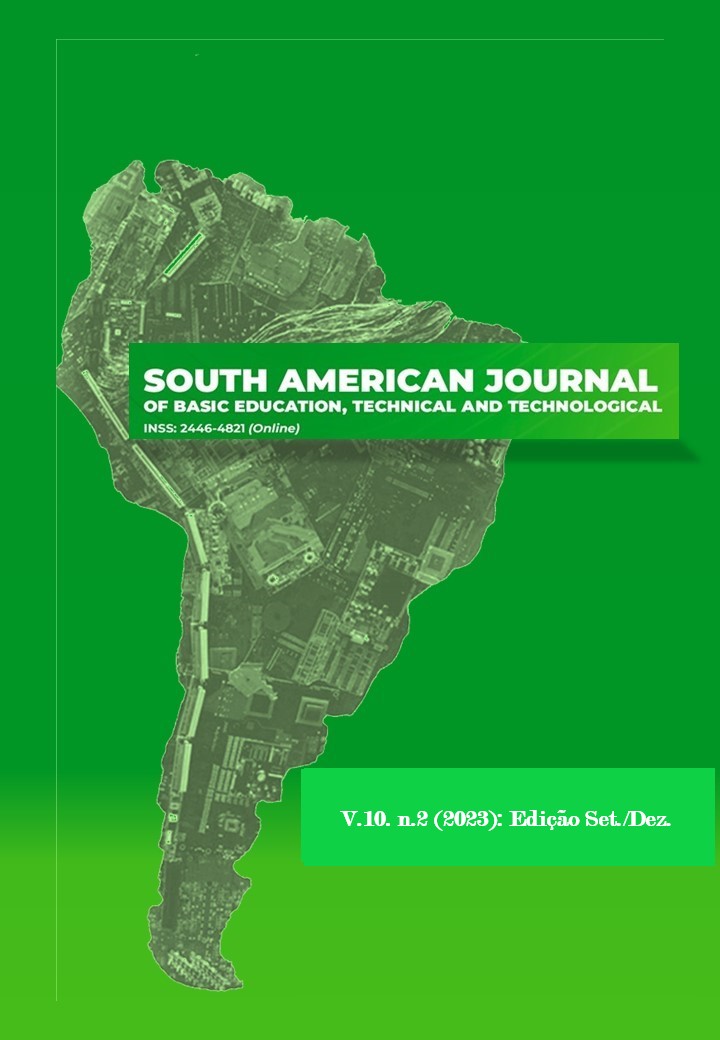O ENSINO REMOTO EMERGENCIAL NO CONTEXTO DA PANDEMIA DE COVID-19: DESAFIOS E POSSIBILIDADES
Keywords:
Palavras-chave: Crise sanitária; Estratégias metodológicas; Tecnologias digitais.Abstract
The COVID-19 pandemic brought great impacts to the education system in Brazil and the world, in an attempt to contain transmission among children, young people and their families, health authorities imposed isolation measures, the campaign "stay at home" was launched, thus suspending face-to-face classes throughout Brazil. In-person classes gave way to emergency remote teaching mediated by Digital Information and Communication Technologies (TDIC). In order to analyze the use of TDIC in the emergency remote teaching period, we seek to investigate through the integrative systematic review which are the main methodological strategies used by teachers during the period of the COVID-19 pandemic and the possible difficulties faced by them during this period. In view of the results found, there were few works related to the strategies used by teachers in this period, we can observe the predominance of studies related to the impacts and difficulties encountered by teachers and students during emergency remote teaching, we can also highlight the lack of training of teachers for the use of technologies, the increase in working time, the weakening of the emotional health of professors and students, the inequalities of access to digital technologies and the little support from the public authorities. In this way, the pandemic showed the need to educate the school community as a whole and the need to digitally include a large part of society.
Downloads
References
COSTA, S.R.S.; DUQUEVIZ, B.C.; PEDROZA, R.L.S. Tecnologias Digitais como instrumentos mediadores da aprendizagem dos nativos digitais. Psicologia Escolar e Educacional, v.19, n.3, p.603- 610, 2015.
ALLAN, L. Como a tecnologia pode ajudar nossas escolas a vencer o coronavírus? Exame, 18 mar. 2020. Disponível em: <https://exame.abril.com.br/blog/crescer-em-rede/como-a-tecnologiapode-ajudar-nossas-escolas-a-vencer-o-coronavirus/>. Acesso em: 13 abril 2022.
MENEZES, S.K.O.; SANTOS, M.D.F. Tecnologias digitais da informação e comunicação e covid-19 no contexto educacional: revisão sistemática da literatura. Holos - Dossiê COVID-19 e o mundo em tempos de pandemia, v.37, n.1, p.1-18, 2021.
BOTELHO, L.L.R.; CUNHA, C.C.A.; MACEDO, M. O método da revisão integrativa nos estudos organizacionais. Gestão e Sociedade, v.5, n.11, p.121-136, 2011.
ARRUDA, R.L.; NASCIMENTO, R.N.A. Estratégias de ensino remoto durante a pandemia de COVID-19: um estudo de caso no 5º ano do Ensino Fundamental. Revista Thema, v.20, p.37-54, 2021.
SILVA, S.R.B. Modernização dependente e a pandemia do covid-19: reflexões sobre ensino presencial e não presencial. Periferia, v. 13, n. 2, p. 49-69, 2021.
CAETANO, M.A.G. Em tempos de ensino remoto: praticando Matemática no Google Forms a partir de um boletim epidemiológico sobre o Coronavírus-Covid-19. REMAT: Revista Eletrônica da Matemática, v. 7, n. 2, p. e2004-e2004, 2021.
GARCIA, J.O.; NASCIMENTO, L.A.; PADILHA, P.A.; LORENZI, K.S.; BORGES, B.G. Pandemia da covid-19 como fenômeno integral e central na educação em ciências. Holos, v. 1, p. 1-14, 2021.
ARAÚJO, S.L.Q.P.; DUTRA, F.B.S. Educação remota em tempos da COVID-19: inquietações acerca da pessoa com deficiência e o Exame Nacional do Ensino Médio. Revista Thema, v. 20, p. 17-36, 2021.
HOLANDA, R.R.; FILHO, T.L.L.; CHAVES, I.T.; MELO, I.R.C.; RIBEIRO, A.A. Educação em tempos de COVID-19: a emergência do EAD nos processos escolares da rede básica de educação. Holos, v.3, p.1-15, 2021.
BRANDENBURG, C.; MACIEL, J.C.S.; BARON, M.V.; COSTA, B.E.P.; SANTANA, J.R. Opinião de diretores quanto a influência da covid-19 no aspecto sócio-emocional-afetivo da comunidade escolar. Holos, v.4, p.1-15, 2021.
MAGALHÃES, R.C.S. Pandemia de covid-19, ensino remoto e a potencialização das desigualdades educacionais. História, Ciências, Saúde-Manguinhos, v. 28, p. 1263-1267, 2021.
DENARDI, D.A.C.; MARCOS, R.A.; STANKOSKI, C.R. Impactos da pandemia covid-19 nas aulas de inglês. Ilha do Desterro, v. 74, p. 113-143, 2022.
PRODANOV, C.C.; FREITAS, E.C. Metodologia do trabalho científico: Métodos e Técnicas da Pesquisa e do Trabalho Acadêmico. 2. ed. Novo Hamburgo: Feevale, 2013.
FERNANDES, F. Capitalismo dependente e classes sociais na América Latina. São Paulo: Global, 2009.
SANTOS, R.B.S.; CAVALCANTE, F.S.A.; LIMA, R.A. Os desafios e as contribuições das TDICs para o ensino no contexto da pandemia de COVID-19: uma revisão sistemática de literatura. Contribuciones a las ciencias sociales, v.16, n.3, p.1215-1231, 2023.










